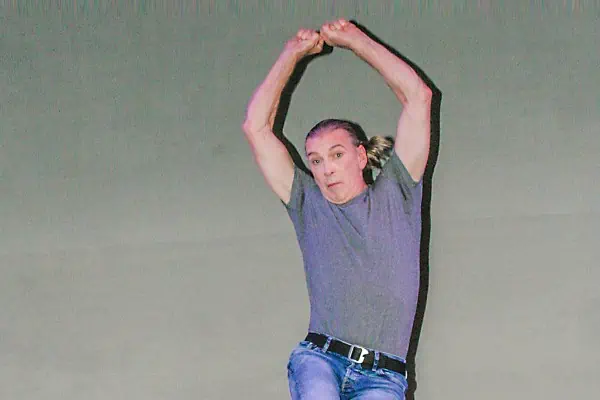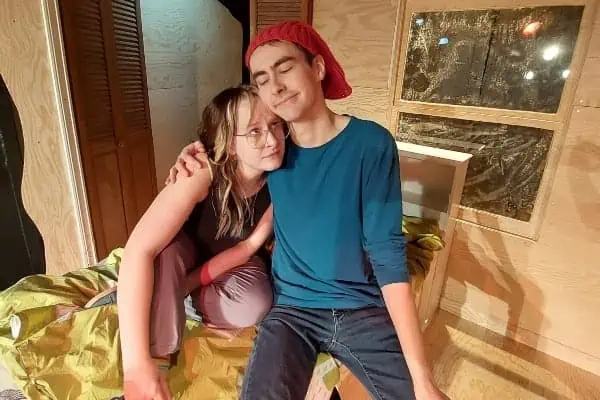Wren Brian was just 10 years old when the first X-Men movie came out in 2000.
The film’s opening scene, set in the infamous Auschwitz concentration camp in Poland, triggered a fascination with the Nazi Holocaust that remains with her today.
Until a single one-hour history lesson in Grade 12, however, the Whitehorse-born playwright had heard very little on the subject in the classroom.
“At the same time, I was taking a psychology class in high school, and noticing that some of the experiments we were talking about had direct correlations to the Holocaust.”
Brian found herself questioning how such atrocities could occur.
“As humans, how could we let that happen?”
A second-year university course on anti-Semitism and the Holocaust provided some of the answers. Others came during a European trip her professor led, which included several of the main Holocaust sites.
“Just being in those places puts a different perspective on it. And being an arts-type person, I’m interested in exploring the emotion of it,” Brian said.
While the emotional impact on victims has been examined at length, it bothers Brian that the “perpetrator/bystander part of it” has not.
“We just don’t talk about it, because it’s uncomfortable,” she said.
“People weren’t monsters. It’s not like the entire German nation turned into monsters overnight. They’re people. They’re humans just like us, and they did this. We could do that, too.”
Brian’s ongoing exploration of the Holocaust and other atrocities led her to write a searing new play called Bystander, which will debut this week in a Gwaandak Theatre production at the Old Fire Hall.
The two-person drama is set against a backdrop of war, but not the Second World War—in fact, not in any particular time or place.
The play opens with a military officer (identified only as “Officer”) knocking on the door of a stranger (“Citizen”), demanding to be let in. The Officer has been delayed while delivering an important secret message and needs a place to stay the night.
“It’s an unusual situation for the Officer as well as for the Citizen.”
As the evening progresses and the two get to know each other, the Citizen invites the Officer to take part in a drinking game, in which deep truths emerge, including what each would be prepared to do in order to survive.
At the outset of the game, neither the audience nor the Officer knows the Citizen’s affiliations, and the Officer is unaware that the Citizen has secretly read the message and been horrified by it.
For the Citizen, the game is a tactic to try and assess what can or cannot be done about what has been learned from the message.
“What I want audiences to take away from this play, I suppose, is a questioning of themselves as humans and what they might do,” Brian said.
“I’d really like them to put themselves in the characters’ shoes and to think about what it would be like to be these people in these situations. To think about what we could really do.”
Brian hopes to provoke an “honest-to-goodness” assessment, rather than what one thinks they might do in an ideal world.
“In this situation, would you really be so much better than these characters? Because, statistically speaking, very few of us would be the one hiding the Anne Frank families.”
In addition to the challenge of writing a play that is not set in a particular time or place, Brian deliberately created characters that do not have any assigned gender, age or ancestry.
“Writing a play to be universal in that way was a bit of a challenge, but it was a fun challenge,” she said.
“I think we get hung up on these ideas of people and who they are. There’s so much in our artistic discourse right now, especially in theatre, of seeing stereotypes on stage all the time. Why does it have to be that way? Because it’s not always that way.”
While the play was in development, Brian and director Clare Preuss floated the idea of rotating the two roles among three actors. Gwaandak’s artistic director, Patti Flather, quickly agreed.
“Yeah, it’s more money to hire a third actor who technically isn’t needed, because it’s only a two-person play, but it’s so cool,” Brian said.
All three actors—Jonathan Fisher, Kevin McLaughlan, and Kaori Torigai—are trained to tackle both roles.
“When you see a male-identified body and a female-identified body in these characters, it does adjust how we see these characters. I find that interesting, and it’s challenging then to go against expectation,” Brian said.
“It’s exciting to see that, because I think there are two ways to look at theatre: either it’s a reflection of our reality, or it’s showing us what it could be, what our life could be like.”
Bystander will run for four official performances at the Old Fire Hall, from Wednesday through Saturday, October 17–20 at 7:30 p.m. There will also be three public previews, on October 13, 14 and 15, also at 7:30 p.m.
Ticket information is available at http://www.gwaandaktheatre.ca/bystander/, or by calling Gwaandak Theatre at 393-2676.




